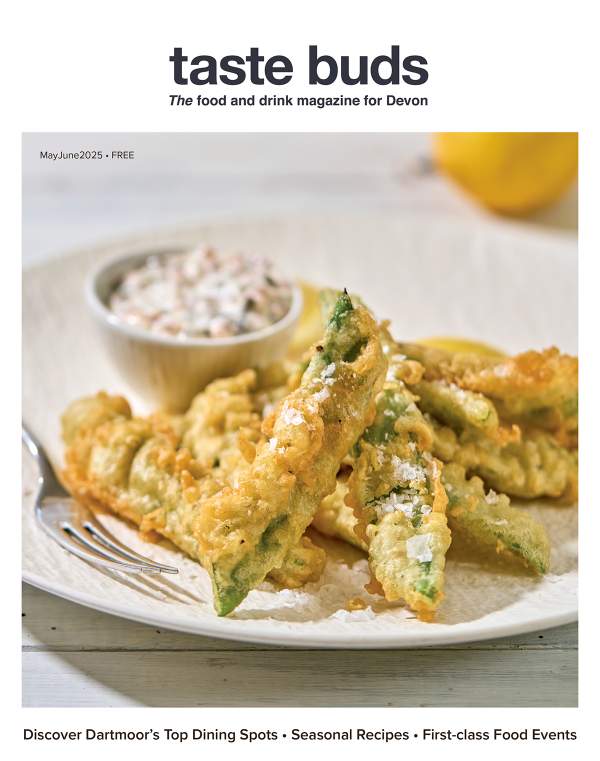Good things come in plastic-free packages. Chrissy Harris finds out what our local firms are doing to reduce waste and become more sustainable
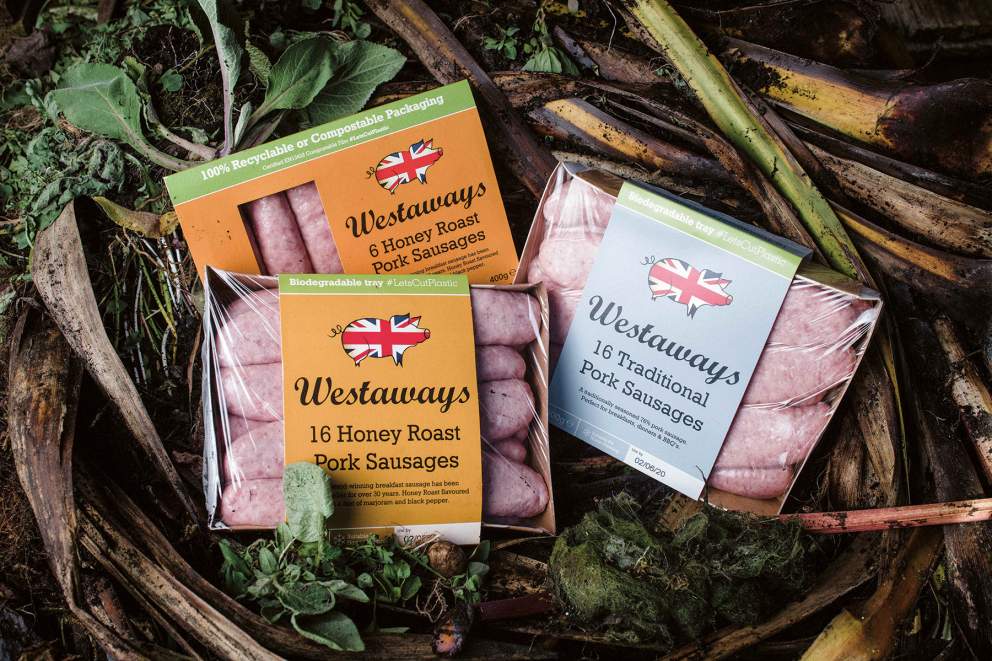
Top local sausage makers, Westaway Sausages, is blazing a trail. It was the first meat producer in the UK to invest in 100% eco-friendly packaging, replacing its PVC overwrap film with a fully home-compostable alternative. It breaks down in your compost heap in just 57 days (the Westaways’ team tried it,) leaving no harmful residues.
Westaways’ owner Charles Baughan even wrapped himself in the Italian-made packaging for a photoshoot to help spread the word following the decision in 2020. Its frozen range now also comes packed in potato starch compostable bags, which double-up as food waste bin liners.
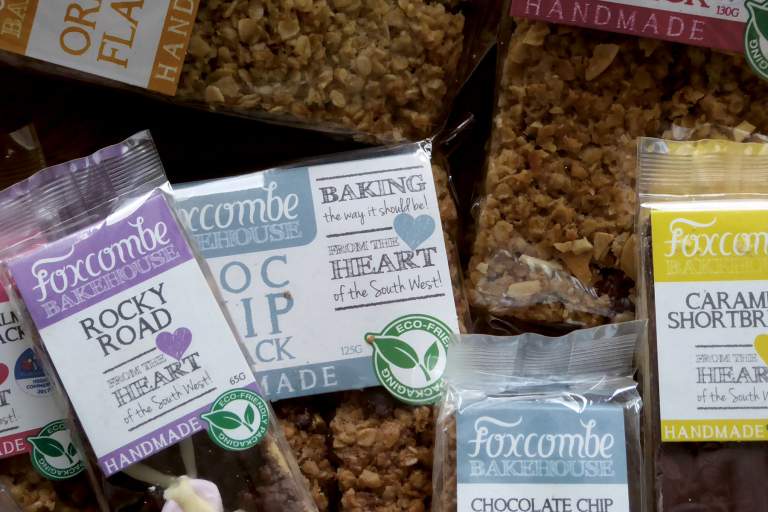
Award-winning, handmade cakes and bakes taste even sweeter when they’re eco-friendly. Foxcombe Bakehouse started in 1998 with Helen Spooncer baking at her kitchen table for the family farm shop in Lewdown. Since then, the company has been on the rise, moving to a purpose-built bakery and developing a reputation for a delicious range of cakes, biscuits, bars and more.
In 2019, Foxcombe introduced plastic-free packaging. The bags are now made from compostable film, which is biodegradable. All cardboard is fully recyclable and accredited with a Forest Stewardship Council certification (FSC). In addition, vegetable-based inks are used for the print on the packaging.
Having a minimal impact on the environment has been the aim here since Venus launched its first outlet at Blackpool Sands beach in 1995. Plastic straws were ditched back in 2000 and stopped being used altogether in 2002.
As the world has changed, Venus has remained true to its cause, working towards eliminating all plastic packaging. Drinks are served in cans or home-compostable cups – and fully home-compostable packaging was introduced last year for the 50,000 cakes baked and sold in its beachside cafés. Takeaway packaging has been designed to be plastic-free and compostable. For every plastic bottle bought in the cafés, a deposit of 50p is taken which is paid back when the bottle is returned.
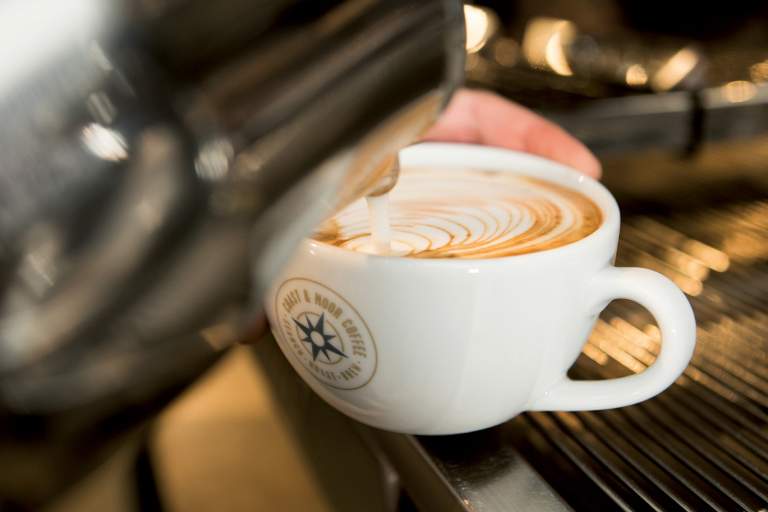
Coast & Moor supports sustainability in all aspects of coffee production and supply. It always recommends having a reusable coffee cup to hand but, if not, all branded takeaway cups and lids are 100% biodegradable and compostable (the business uses Vegware packaging which is made from plants).
The team isn’t afraid to get its hands dirty either. Coast & Moor organises regular local clean-up events and has funded litter-picking stations, such as the one at Putsborough Beach Café. Passers-by can take a grabber and a bag and do their bit to tidy up the coast.
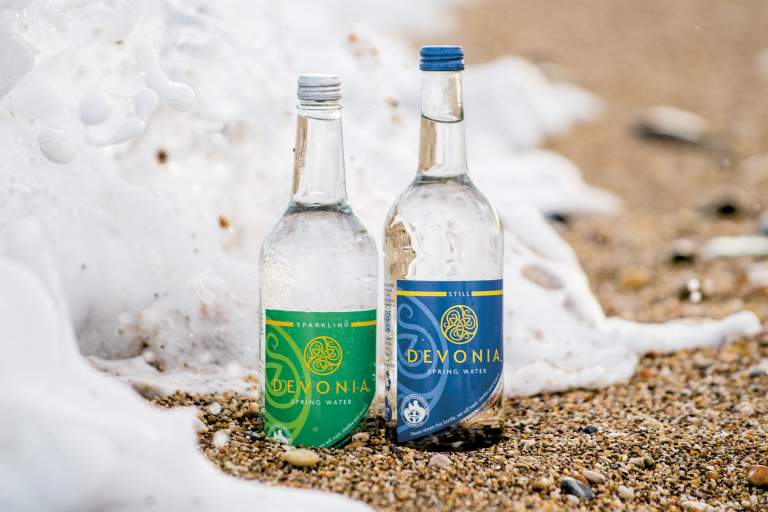
Neil Graham took over the running of natural spring water firm Devonia in 2014, and has been working to boost sustainability ever since. Devonia is the only spring water company in the south of England with a business model centred on continuously reusing glass bottles. The firm collects the empties from their various customers, including pubs, cafés, restaurants and hotels, then washes and reuses them for the next batch.
Since the start of 2022, Devonia has sold 336,000 bottles of water and reused an impressive 285,000 – that’s a reuse rate of 90%. Washing and refilling the bottles uses just 6% of the energy required to recycle glass, helping to reduce CO2 emissions.
Devonia’s water is bottled at source from a spring that bubbles up on the edge of a meadow near the villages of Beeson and Beesands, less than a mile from the sea.
The staff here are passionate about reducing single-use plastic in this family-run store which has a butchery and bakery, along with fresh vegetables, fruit, dairy and other local products. Inside, there is a refill station for dried goods, including pantry staples, cereals and a selection of treats. Customers are encouraged to bring their own containers or use one of the available paper bags.
At the butchery counter, locally sourced meat is wrapped in paper, rather than plastic, wherever possible. Recyclable or compostable trays are used for ready meals. Paper bags are used for bakery and fresh produce items. Customers can also choose compostable food bags, which can be reused in food waste bins.
In the café, the team makes small changes where possible, using compostable takeaway packaging, paper straws, and recycling bottles and cans.
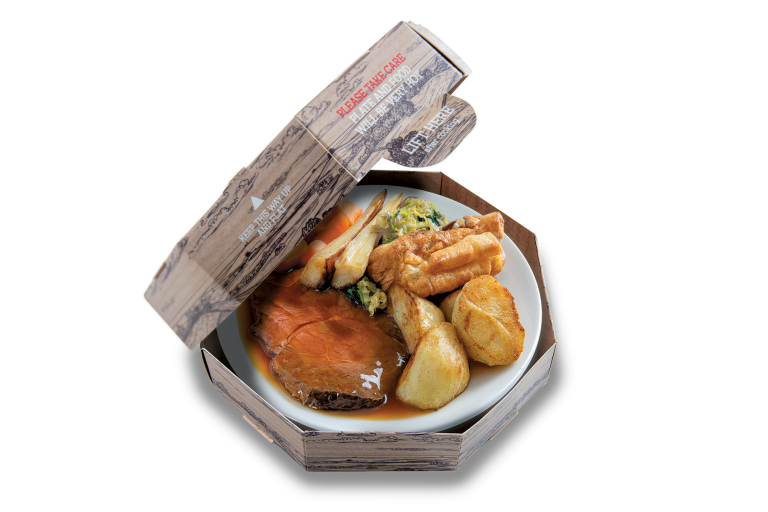
Devon Farm Kitchen is an innovative new social enterprise, delivering frozen meals direct to homes in South Devon. Chefs and dieticians prepare all the meals by hand, using locally sourced ingredients. Every penny of the profit goes to support Rowcroft Hospice in providing critical end-of-life care for local patients with life-limiting illnesses.
As well as supporting a good cause, Devon Farm Kitchen is helping the fight against plastic waste. The service uses recyclable and returnable ceramic plates and bowls with no plastic packaging. The plates and bowls are collected on the next delivery, or whenever is convenient. Any packaging used is carbon neutral, recyclable and compostable.
“At Devon Farm Kitchen, we pride ourselves on being ‘zero landfill’, and we strive to put environmental considerations ahead of profit,” says general manager Joe Bradshaw. “Our customers are pleased to receive their meals on returnable and reusable ceramic plates, and we hope this innovative model revolutionises the way people think about packaging.”
The ceramic plates (made from Cornish clay) make it easy for customers to cook the meals in a microwave or conventional oven. Joe adds: “This model of sustainability is a key selling point for our meals: it makes for happy customers and a greener planet.”
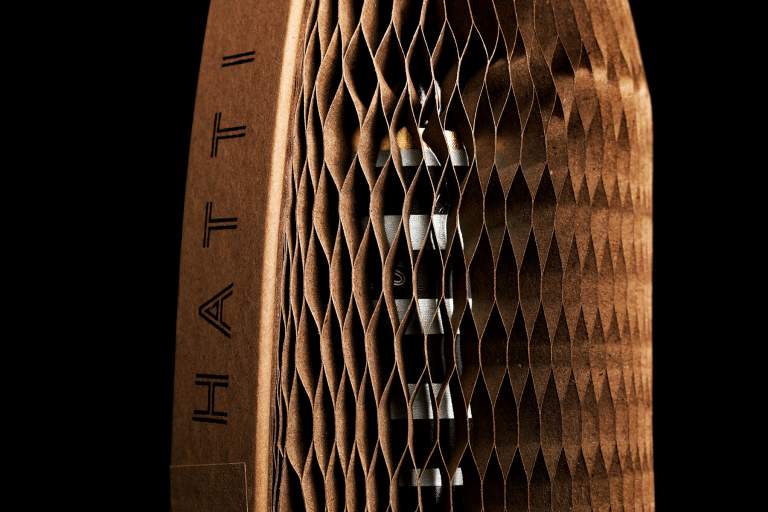
Hattiers has created the UK’s first B Corp certified rum and the team here has an ‘uncompromising approach’ to quality and sustainability.
It was an early adopter of innovative packaging solutions from fellow B Corp Flexi-Hex. Hattiers’ packaging is made from 100% recycled material and is recyclable, biodegradable and compostable. Customers can be assured that their rum will arrive safely and in beautiful packaging that really doesn’t cost the earth.
Hattiers is also working hard to reduce the weight of its glass bottles by at least 30% to reduce its product carbon footprint.
Six times a year, delivered to your door
Annual subscription: £18
Single Issue: £4
MayJune 2025 issue out now
Try before you buy. View digital edition
Go to Shop